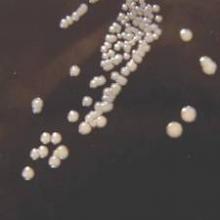Danish researchers reported a slightly heightened vulnerability to child-onset epilepsy in infants who contract pertussis, which strikes an estimated 16 million children globally on an annual basis, in a study published in the Nov. 3 issue of JAMA.
Dr. Morten Olsen of the department of clinical epidemiology, Aarhus (Denmark) University Hospital, and his colleagues collected data from population-based medical registries encompassing every hospital and citizen in Denmark (roughly 5.6 million people) to catalogue all patients presenting with pertussis born between 1978 and 2011. Subjects were tracked for a maximum of 15 years, beginning with their respective initial pertussis diagnosis dates, up until their first-time epilepsy diagnosis, emigration, death, or Dec. 31, 2011 (whichever occurred first). To establish a control cohort, the national Danish Civil Registration System database was mined to identify and select 10 age- and sex-matched individuals from the general population for each patient with pertussis (JAMA. 2015 Nov 3;314[17]:1844-9).
Of the 4,700 identified pertussis patients (53% of whom were younger than 6 months of age when initially diagnosed with pertussis), 90 (2%) subsequently developed epilepsy (incidence rate, 1.56/1,000 person-years; 95% confidence interval, 1.55-1.57), compared with 511 (0.1%) in the 47,000-subject comparison arm (incidence rate, 0.88/1,000 person-years; 95% CI, 0.88-0.88). Pertussis patients were found to have a cumulative epilepsy incidence rate of 1.7% (95% CI, 1.4%-2.1%) at age 10 years; cumulative epilepsy incidence at age 10 years was 0.9% (95% CI, 0.8%-1%) in the control population. Moreover, epilepsy risk was demonstrated to be dependent on age of pertussis onset; a pertussis diagnosis was not associated with increased epilepsy risk in patients over the age of 3 years (hazard ratio, 1; 95% CI, 0.5-1.8).
According to study investigators, one explanation for the role that pertussis could potentially play in the pathophysiology of epilepsy may center on the occurrence of hypoxic brain damage resulting from severe pertussis-related coughing, “perhaps via increased intrathoracic and intra-abdominal pressure and central nervous system hemorrhages.”
The study was funded by the Program for Clinical Research Infrastructure established by the Lundbeck Foundation and the Novo Nordisk Foundation. The department of clinical epidemiology, Aarhus (Denmark) University Hospital, receives funding for other studies from companies in the form of research grants.


